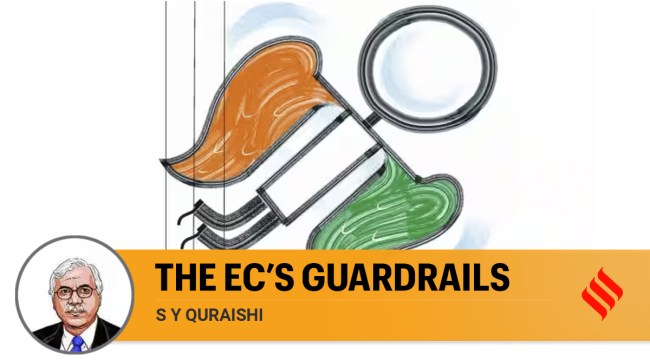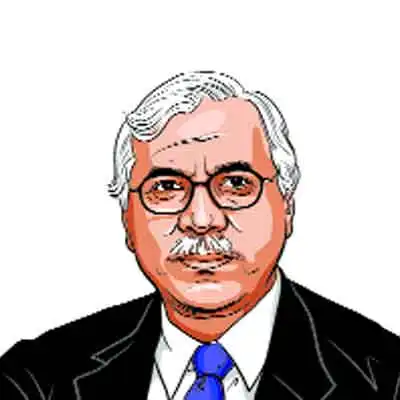Opinion S Y Quraishi on the Collegium bill: How to make Election Commission credible
Collegium proposed by a new bill to select the election commissioner will be more effective if its decisions are unanimous
 Maintaining the EC’s institutional autonomy is urgent in the current national and international context. There has been an increasing global erosion of trust in electoral institutions. (Illustration by C R Sasikumar)
Maintaining the EC’s institutional autonomy is urgent in the current national and international context. There has been an increasing global erosion of trust in electoral institutions. (Illustration by C R Sasikumar) On Thursday, the day before the Monsoon Session is set to end, the government tabled the Chief Election Commissioner and other Election Commissioners (Appointments, Conditions of Service, Term of Office) Bill in the Rajya Sabha. This comes after the Supreme Court’s landmark verdict in March on the appointment process of polling officials. The proposed Bill effectively stands to dilute the SC verdict and many of the concerns that the SC verdict had warned against. This Bill is also not part of the 31 bills listed for passage during the session.
In March, in a unanimous verdict, a five-judge constitution bench headed by Justice K M Joseph ruled that a panel comprising the Prime Minister (PM), the Leader of the Opposition (LoP), and the Chief Justice of India shall appoint CEC and ECs until Parliament brings a law, underlining that the independence of the Election Commission requires a collegium. The court had said that the purity of the election process must be maintained to preserve democracy, else it “would lead to disastrous consequences”. The presence of the CJI was required to usher in impartiality and insulate the appointment process from the Executive’s interference.
The Bill now proposed by the Union government, seeks to replace the CJI with a Cabinet Minister nominated by the Prime Minister. However, it proposes a welcome addition — a search committee, headed by the Cabinet Secretary, with two other members not below the rank of secretary to the government, to prepare a panel of five members for the consideration of the Selection Committee.
Another positive feature of the Bill is that the CEC and other ECs will be appointed from “amongst persons who are holding or have held a post equivalent to the rank of secretary and shall be persons of integrity, who have knowledge of and experience in the management and conduct of elections”. Earlier, there was no rule prescribing the qualifications for appointment to the posts, which was a major matter of concern with the risk of appointment from some other catchment area.
One reason the March verdict was important is because it addressed the issue of partisanship and institutional autonomy. The current selection process — by the President on the advice of the PM and the Cabinet — does a grave disservice to newly appointed ECs. No matter how illustrious and impeccable their backgrounds, they still suffer the risk of being seen through the lens of partisanship. Their institutional actions carried out in good faith and in the course of their duty are often projected as one favouring a particular party. For this reason, it was important to have a collegium to improve the public perception of the Commission’s neutrality and independence.
The SC verdict had maintained that the CJI’s presence could quell the executive’s unchecked and unaccounted-for hold over appointments, as all governments will want “yes men in the poll panel”. But the government, while proposing the Bill, called it a “fallacious” and “constitutionally impermissible” suggestion that the executive cannot make an honest selection without the help of the judiciary.
Maintaining the EC’s institutional autonomy is urgent in the current national and international context. There has been an increasing global erosion of trust in electoral institutions. According to the Gallup World Poll, only 50 per cent of voters are reported to have confidence in the honesty of elections, while in the USA, the figure in 2019 stood at 40 per cent.
Even in India, over the past few years, the EC’s credibility is increasingly being called into question, with allegations of bias in the scheduling of elections and arbitrary deletion of names of registered voters, ignoring blatant violations of the model code. The recent democracy reports of the V-Dem Institute highlight that various indicators of democracy in India, including the autonomy of the ECI, have been declining.
Amidst these debates, we must remember that even the collegium model is not perfect. The CBI directors have also been appointed through collegium,and some of them have not covered themselves with glory. Some had questioned the CJI’s inclusion in the collegium. For one, he may be a legal expert but is hardly likely to know the candidates. Secondly, how can he sit in judgement if an appointment is challenged in the SC?
To perfect this model — whether it’s the collegium model from the SC verdict or the one proposed in the Rajya Sabha Bill — I propose that the collegium system will be all the more credible if a unanimous verdict is added as a precondition to the appointment. Will it amount to giving veto power to the LoP? Not at all, if the choice is limited to the five candidates shortlisted by the Cabinet Secretary-led committee. It can be safely presumed that the committee wouldn’t spring a surprise on the PM by proposing an “offensive” name. However, the clause that the Selection Committee can choose anyone from outside the shortlist is absolutely undesirable and makes a mockery of the shortlisting committee.
One extremely important provision of the Bill is that it seeks to protect the two Election Commissioners from removal, bringing them on par with the CEC. They can be removed through a process of impeachment like a SC judge. This has been a demand for two decades.
There is one more provision of major concern. The Commissioners, who were equated with SC judges since the Act of 1991, are being downgraded. While the salary of the EC then and now is the same as that of CS (and the SC judge), the rank in the warrant of precedence is being reduced. I hope that is not intentional and will be corrected.
The Election Commission of India has for long been a shining symbol of democracy all over the world. To consolidate this reputation, we must ensure all the safeguards are in place to quell the possibility of any question mark on its credibility and status.
The writer is former Chief Election Commissioner of India and the author of An Undocumented Wonder – The Making of the Great Indian Election






